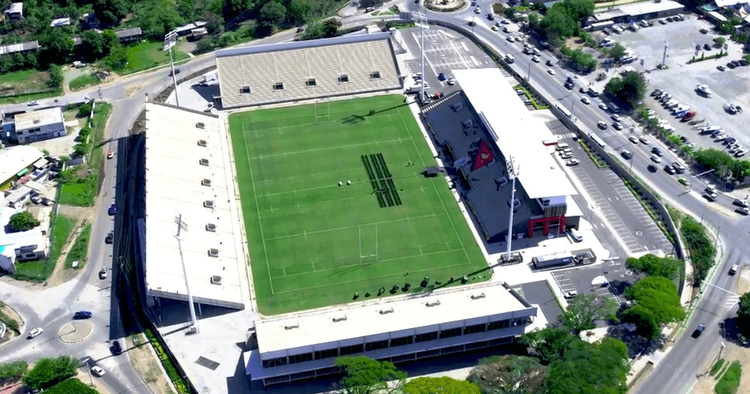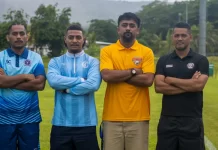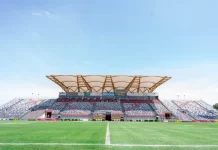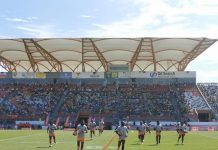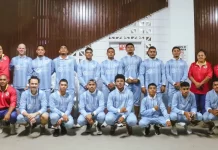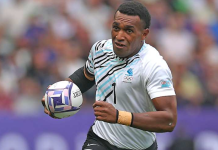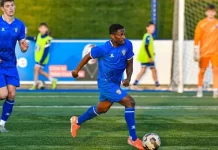Papua New Guinea Prime Minister James Marape has officially announced that the Sir Hubert Murray Stadium (SHMS) will serve as the home ground for Papua New Guinea’s inaugural NRL team, solidifying the country’s ambitions for a stronger presence in the prestigious rugby league competition.
While SHMS is the preferred choice, Marape acknowledged that if the stadium was not ready by 2028, the Santos National Football Stadium would temporarily host NRL games.
However, he emphasised that SHMS would be the permanent venue in the long run.
Governor Powes Parkop has assured that plans were already in motion to ensure SHMS is NRL-ready before 2028.
He confirmed ongoing discussions with investors and partners to fast-track the stadium’s completion.
The reason given with the choice of the SHMS are the venue’s historical significance as one of the country’s most iconic stadiums, its larger capacity (25,000 spectators, compared to 15,000 at the NFS), permanent structure – built from concrete and steel, whereas Santos relies on a temporary scaffold framework, prime location that offers easy access for fans and officials, offers scenic views in the downtown landscape of Port Moresby.
The planned upgrades for SHMS to meet NRL standards will see the venue undergo major upgrades in two phases: Stage 1 – Internal Enhancements – roofing, seating, lighting, and communications infrastructure and final touches to ensure a top-tier game-day experience; Stage 2 – Stadium Expansion and Development – a high-rise hotel and car park complex, integrated with Harbour City’s corporate developments.
This announcement marks a major milestone in PNG’s rugby league journey, bringing the country closer to securing a full-time NRL licence.
The SHMS project is expected to boost sports tourism, economic growth, and international recognition for Papua New Guinea beyond 2028.
Meanwhile, former Papua New Guinea Kumul forward David Loko says while the country’s admission into the National Rugby League is a great boost for the sport and the people the development of the code is still lagging in many areas including the academy and pathways for juniors and school competitions.
The PNG NRL franchise is set to enter then Australian competition in 2028 with efforts being made by the PNGRFL and national government in conjunction and with the support of the Australian Government and NRL to ensure Port Moresby is ready to host the venture.
Loko said following the signing event in Port Moresby last week that it was a proud moment for the country and for all stakeholders but the drivers of the sport in the country needed to be honest and realise that the academy and pathway development programme needed to have been in place long before the NRL question had been revisited two years ago.
Loko said the first PNG NRL Bid in the mid to late 2000s needed to have seen such initiatives such as the junior programme established and carried on through readying the country for the eventual NRL licence.
“We signed it, but our pathway just started,” Loko told The National.
“Rugby league is not rocket science and a star or champion cannot be developed overnight. We should have developed or introduced the academy pathway years back. Our factory of players is just started in 2024 I believe, that’s not possible, look at NRL their (clubs’) academies are already there before they enter the top tier comp which is NRL.
“As a former Kumul and Hunter I am excited and proud that we now have a team in the NRL. The question is, where will we get the players from, where will we conduct our recruitment? Will these academy and development players be already ready by 2028? These are some questions that need consideration.”
Loko said the quick fix would be bring in most of the talent from overseas to ensure a competitive team, but this could not be a long term solution nor was it sustainable and defeated the purpose of having the team in the first place which was to develop local talent for the team.
“If the PNG franchise signs players (from overseas) to play for the team, that’s fair enough, because we will not be able to fill the team with native players with NRL level talent in time because we’ve just started (our junior development).”
Loko also called on the PNGRFL and PNG NRL franchise to involve former players from the professional era to be involved across all levels of the game and programmes throughout the country where possible as they bought first-hand experience of the game in playing, preparation and other aspects of the athlete experience.
He added that the Digicel ExxonMobil Cup competition and the PNG Hunters needed to be managed prudently as these would be the places where local talent would be identified.
“PNGRFL and the franchise board should have consultation with former players, so we work together in delivering rugby league development to academy players in our pathway programmes.
“Rugby league is a physical game and needs people with hands-on experience to move the job.
“When we talk about pathway it starts from as young as six years of age and goes all the 20, these ages really need close monitoring and mentoring to prepare the best.
“Our DEM Cup comp is not enough to produce NRL material, even Hunters. The wider rugby league community in Australia knows that we don’t have a factory of junior players (academy pathway development),” he said.






